Introduction
The Health Foundation commissioned Ipsos MORI to do a survey of the general public in Great Britain on their views about funding of the NHS, as well as the provision of NHS and social care services.
The survey was carried out in May 2017. We have analysed some of the findings from the survey. We have also provided comparisons with the results of an Ipsos MORI survey that we commissioned in 2015 and with NatCen’s British Social Attitudes survey of 2014.
Key findings
- Protecting the NHS from cuts is important to the majority of the general public – 88% selected ‘the NHS/health care’ as a main area of public spending that should be protected. Fewer people think that schools (56%) and care for older people (40%) should be protected.
- Nearly two-thirds of people think that taxes should be increased to fund the NHS – 64% would prefer to see increased taxes rather than reduced levels of care (9%) or reduced spending on other services (17%).
- Nine in 10 people (88%) agree that the NHS should be tax funded, free at the point of use, and provide comprehensive care for all citizens. This is up marginally from 85% in 2015. The proportion of people giving the maximum possible agreement (a score of 10 out of 10) has increased from 49% to 61%.
- Only 12% of people think the general standard of NHS care has improved over the past year, although slightly more (14%) think it will get better over the next year. Forty-four percent of people think the general standard of NHS care has worsened over the past year. Almost half (48%) think it will get worse over the next year.
- For social care, just 8% of people think it has improved over the past year, while 50% think it will get worse over the next year.
- While almost a third of people (30%) don’t have a preference for where they receive NHS-funded care (ie from an NHS or non-NHS provider), there has been an increase in the number of people preferring to go to an NHS-provided service – 55%, up from 39% in the 2014 British Social Attitudes survey.
- Half of respondents (50%) think the NHS often wastes money – this reflects no change from 2014.
- Almost nine in 10 people (87%) think that existing NHS and social care workers who are from the EU should be allowed to stay when the UK leaves the EU.
- Most people think that NHS workers should receive basic annual pay increases above the 1% currently planned, with 78% saying the limit should be higher. Just 17% think pay increases should stay at 1%.
- People’s biggest concern when going into their local A&E is waiting times (70%). All other concerns polled below 20%.
Public spending cuts
Protecting the NHS from cuts is important to the majority of the general public – 88% selected ‘the NHS/health care’ as a main area of public spending that should be protected. Fewer people think that schools (56%) and care for older people (40%) should be protected.
Which two or three, if any, of the following main areas of public spending do you think should be protected from any cuts?
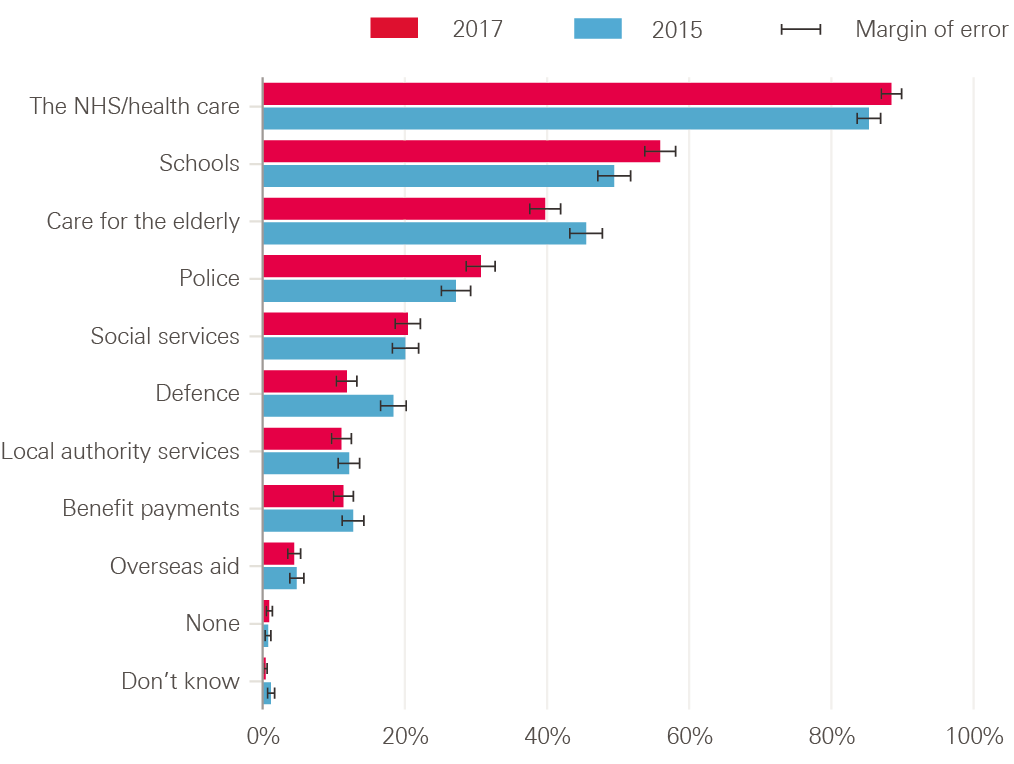
Source: Health Foundation analysis of Ipsos MORI survey of 1,985 adults in Great Britain aged 15 and over, May 2017, and Ipsos MORI survey of 1,792 adults in Great Britain aged 15 and over, March 2015.
Options to increase NHS spending
Nearly two-thirds of people think that taxes should be increased to fund the NHS – 64% would prefer to see increased taxes rather than reduced levels of care (9%) or reduced spending on other services (17%).
Many experts argue that it is becoming more expensive to fund the NHS because of increasing costs of treatments, an ageing population and several other factors. This means that even in order to maintain the current level of care and services provided for free by the NHS, spending on the NHS would have to increase. With that in mind, which, if any, of the following would you most like to see?
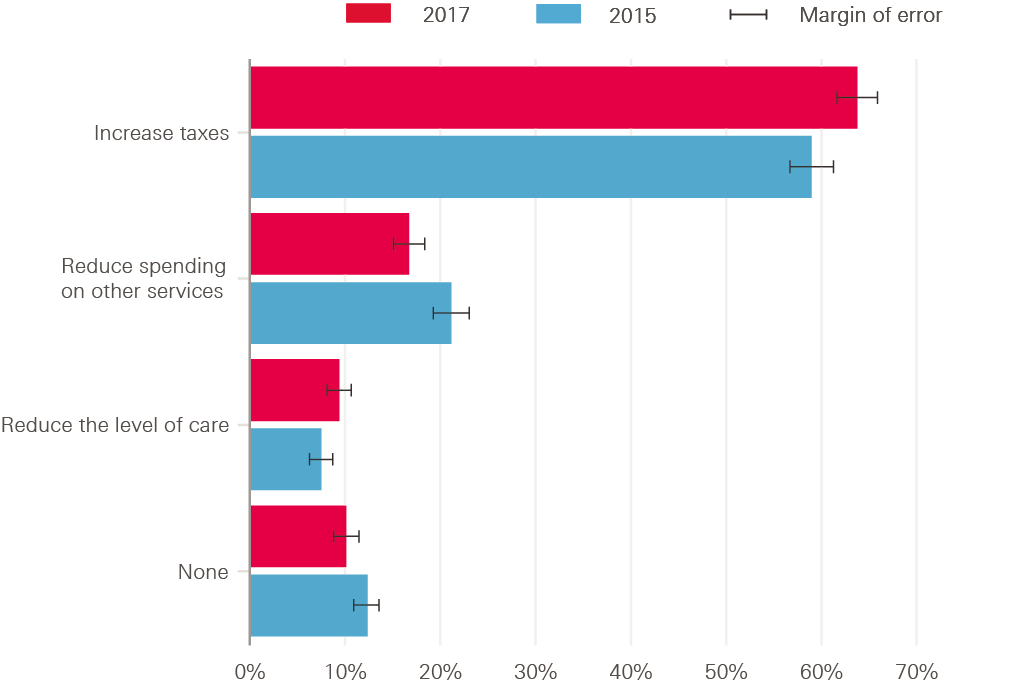
Source: Health Foundation analysis of Ipsos MORI survey of 1,985 adults in Great Britain aged 15 and over, May 2017, and Ipsos MORI survey of 1,792 adults in Great Britain aged 15 and over, March 2015.
Government-supported NHS
Nine in 10 people (88%) agree that the NHS should be tax funded, free at the point of use, and provide comprehensive care for all citizens. This is up marginally from 85% in 2015. The proportion of people giving the maximum possible agreement (a score of 10 out of 10) has increased from 49% to 61%.
The government should support a national health system that is tax funded, free at the point of use, and providing comprehensive care for all citizens.
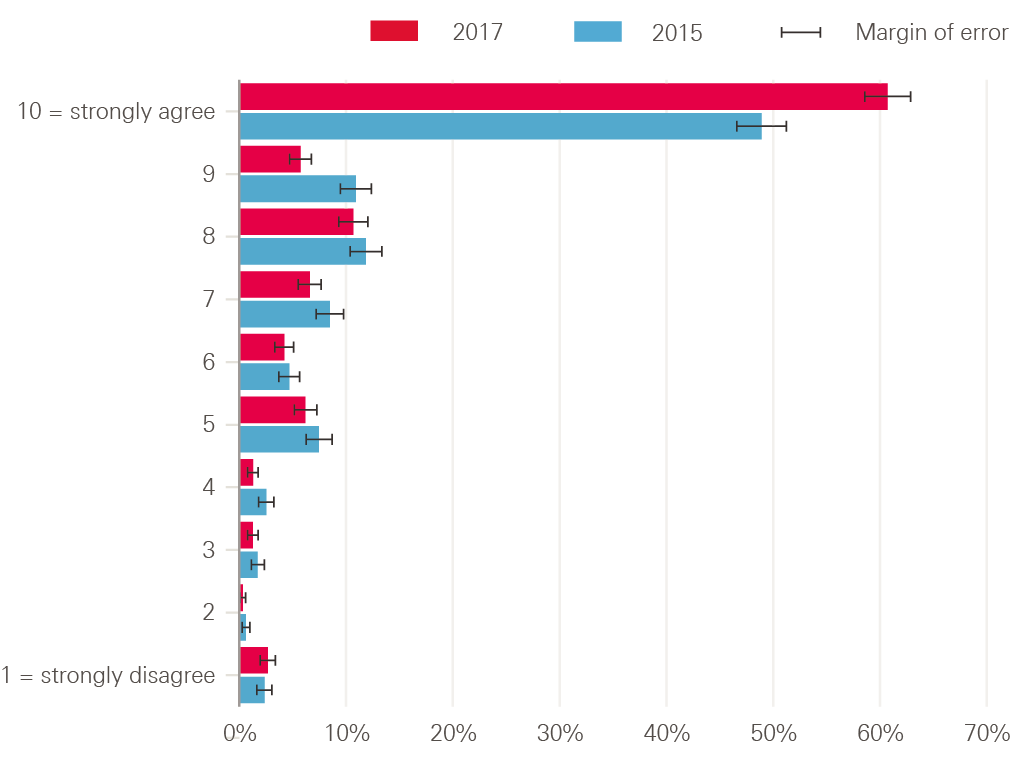
Source: Health Foundation analysis of Ipsos MORI survey of 1,985 adults in Great Britain aged 15 and over, May 2017, and Ipsos MORI survey of 1,792 adults in Great Britain aged 15 and over, March 2015.
General standard of NHS care
Only 12% of people think the general standard of NHS care has improved over the past year, although slightly more (14%) think it will get better over the next year. Forty-four percent of people think the general standard of NHS care has worsened over the past year. Almost half (48%) think it will get worse over the next year.
How people think the general standard of NHS care has changed/will change
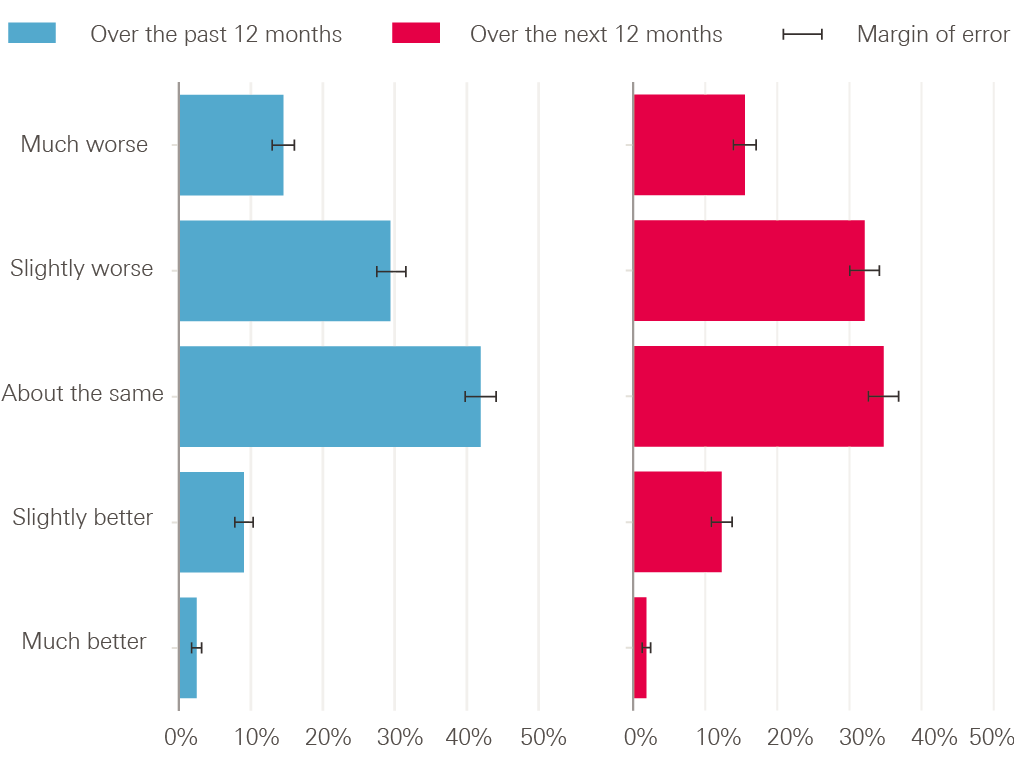
Source: Health Foundation analysis of Ipsos MORI survey of 1,985 adults in Great Britain aged 15 and over, May 2017.
General standard of social care
For social care, just 8% of people think it has improved over the past year, while 50% think it will get worse over the next year.
How people think the general standard of social care has changed/will change
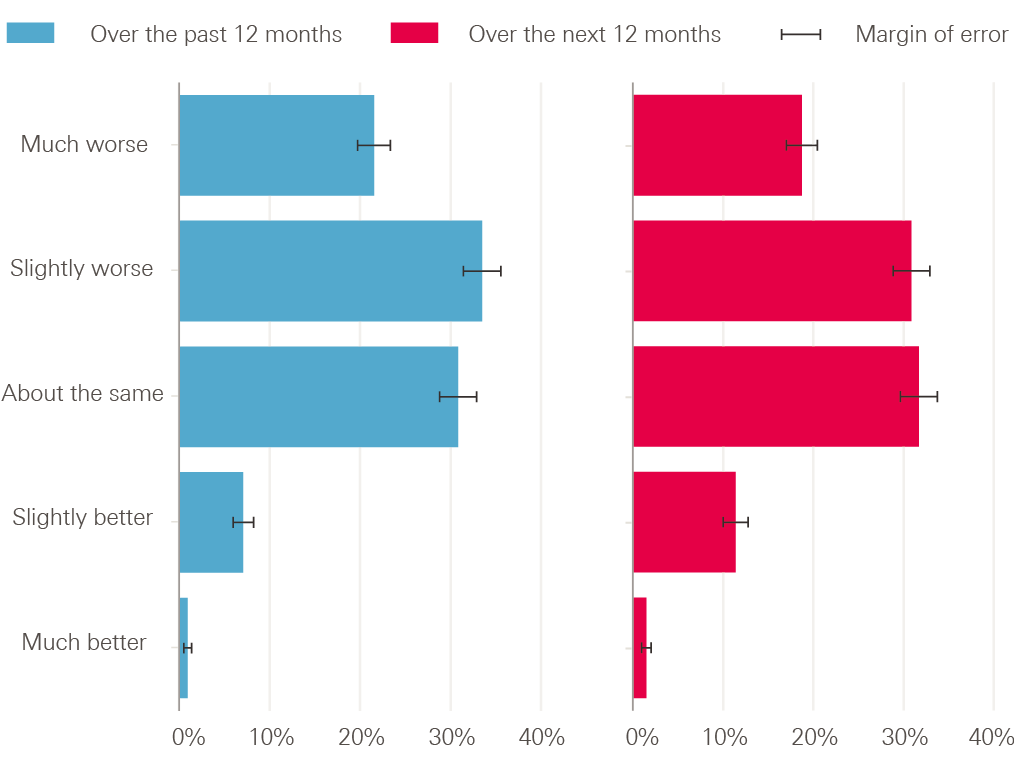
Source: Health Foundation analysis of Ipsos MORI survey of 1,985 adults in Great Britain aged 15 and over, May 2017.
Hospital treatment
While almost a third of people (30%) don’t have a preference for where they receive NHS-funded care (ie from an NHS or non-NHS provider), there has been an increase in the number of people preferring to go to a service provided by the NHS – 55%, up from 39% in the 2014 British Social Attitudes survey.
Imagine you were a patient about to have hospital treatment and that this treatment was being paid for by the NHS. Would you prefer to receive the treatment from…?
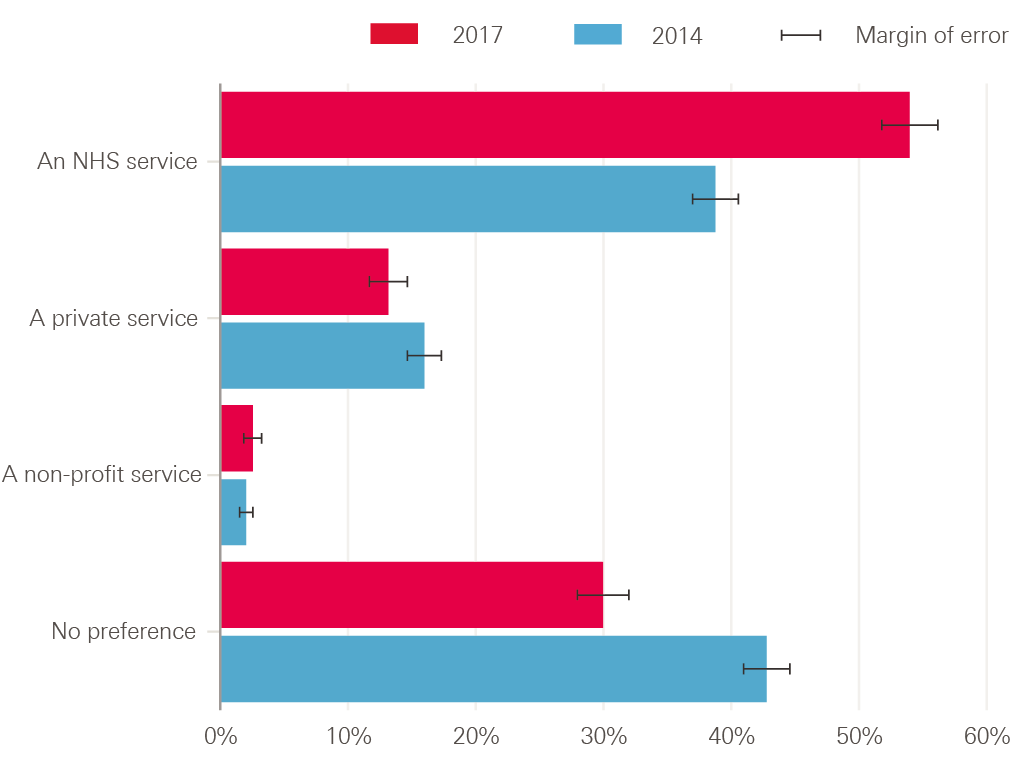
Source: Health Foundation analysis of Ipsos MORI survey of 1,985 adults in Great Britain aged 15 and over, May 2017, filtered to adults aged 18 and over (1,944 respondents), and NatCen’s British Social Attitudes survey of 2,878 adults in Great Britain aged 18 and over, 2014.
Waste in the NHS
Half of respondents (50%) think the NHS often wastes money – this reflects no change from 2014.
Thinking about the NHS as a whole, which of the following statements best reflects your views on the way the NHS uses money?
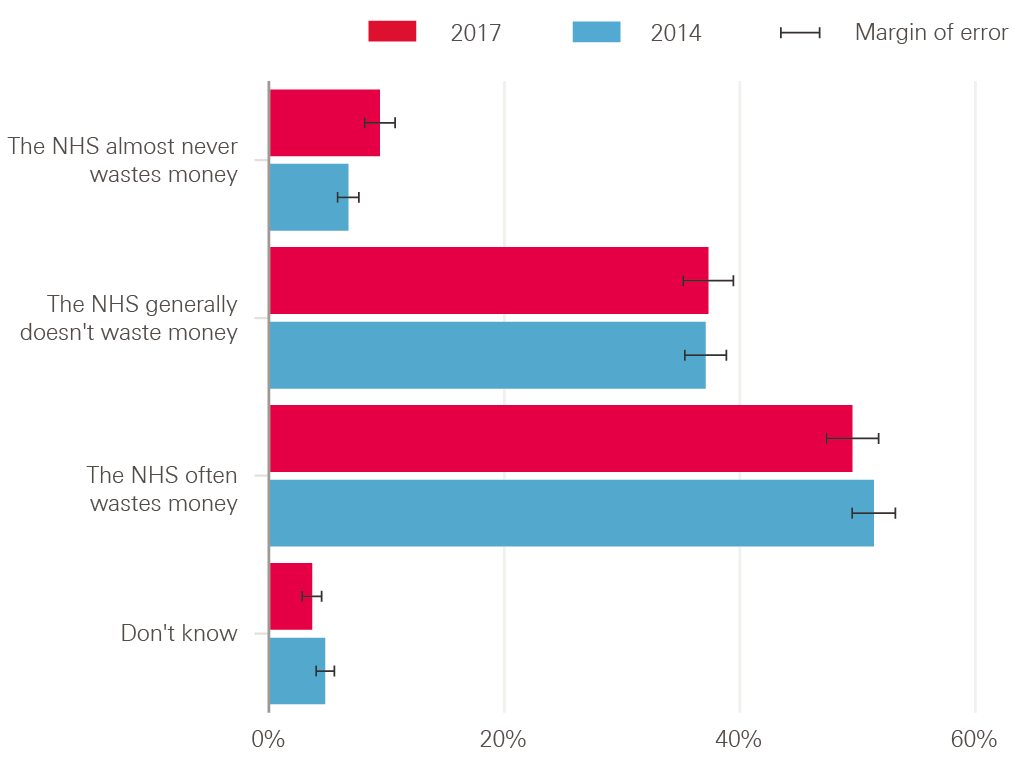
Source: Health Foundation analysis of Ipsos MORI survey of 1,985 adults in Great Britain aged 15 and over, May 2017, filtered to adults aged 18 and over (1,944 respondents), and NatCen’s British Social Attitudes survey of 2,878 adults in Great Britain aged 18 and over, 2014.
Brexit
Almost nine in 10 people (87%) think that existing NHS and social care workers who are from the EU should be allowed to stay when the UK leaves the EU.
When Britain leaves the EU, do you think that NHS and social care workers who are from the EU should or should not be allowed to stay in the UK?
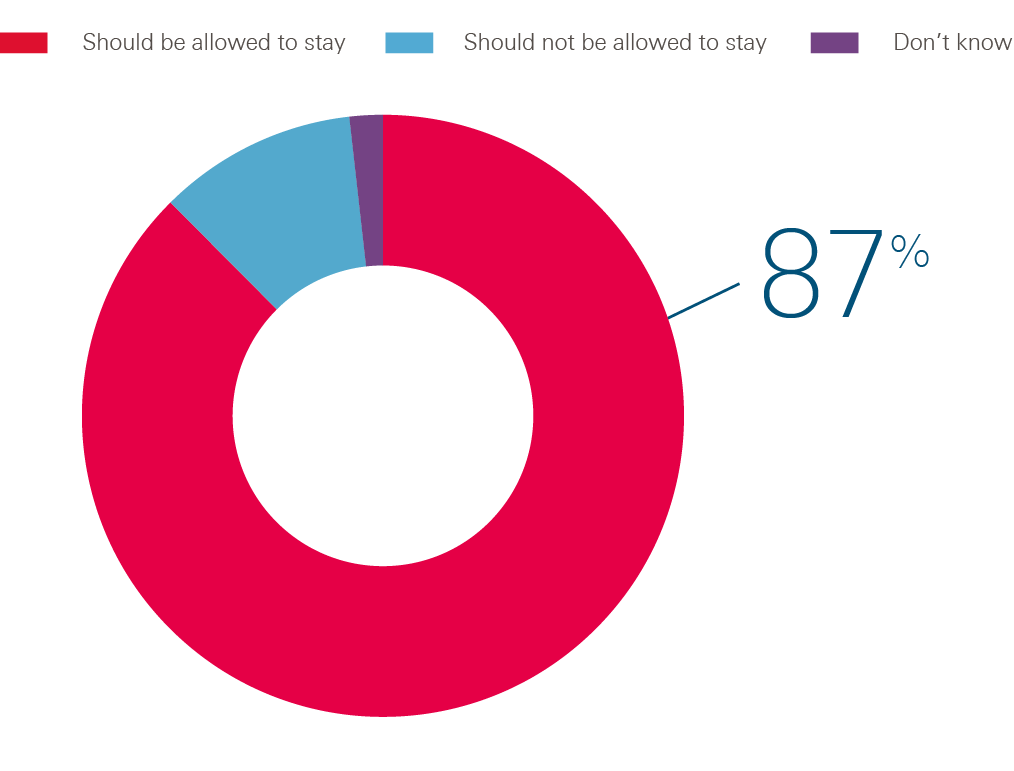
Source: Health Foundation analysis of Ipsos MORI survey of 1,985 adults in Great Britain aged 15 and over, May 2017.
NHS staff pay increases
Most people think that NHS workers should receive basic annual pay increases above the 1% currently planned, with 78% saying the limit should be higher. Just 17% think pay increases should stay at 1%.
Which, if any, of the following do you think should apply to annual basic pay increases for NHS staff?
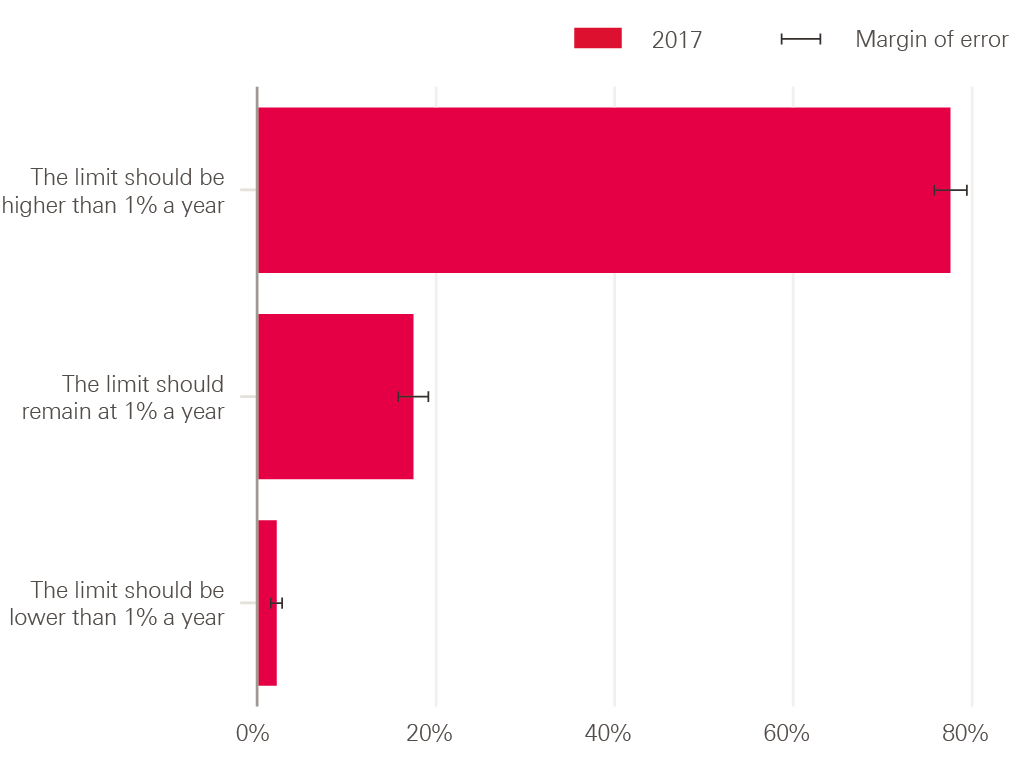
Source: Health Foundation analysis of Ipsos MORI survey of 1,985 adults in Great Britain aged 15 and over, May 2017.
A&E concerns
People’s biggest concern when going into their local hospital A&E is waiting times (70%). All other concerns polled below 20%.
If you had to visit your local hospital’s A&E department as a patient, what concerns, if any, would you have about going there?
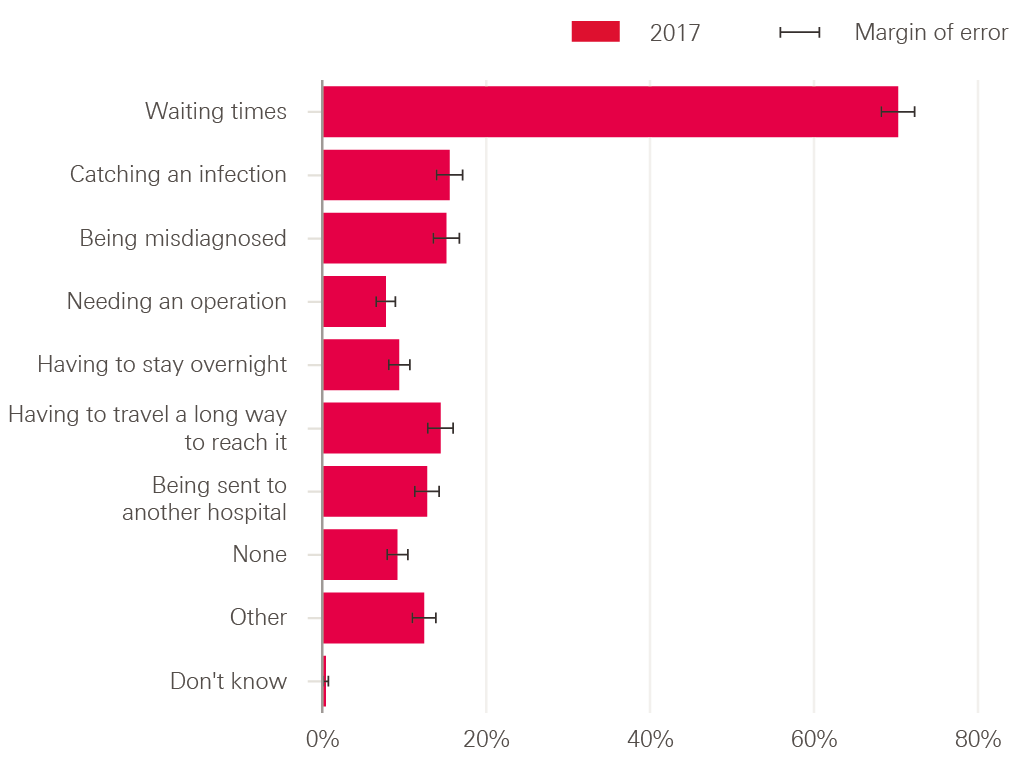
Source: Health Foundation analysis of Ipsos MORI survey of 1,985 adults in Great Britain aged 15 and over, May 2017.
About the 2017 Ipsos MORI survey
Interviews were carried out on Capibus, Ipsos MORI’s face-to-face omnibus survey. 1,985 adults aged 15 and over in Great Britain were interviewed between 5 and 15 May 2017 in respondents’ homes using CAPI (computer-aided personal interviewing) methodology.
Data are weighted to age, region, working status and social grade within gender, as well as household tenure and respondent ethnicity using rim weighting.
Where comparisons are made with the 2014 British Social Attitudes survey, the sample is filtered only to adults aged 18 and over and weighted to a profile reflecting this age range.
About the 2015 Ipsos MORI survey
Ipsos MORI surveyed 1,792 adults in Great Britain aged 15 and over. Respondents were interviewed face-to-face between 13 and 29 March 2015.
Data were weighted to reflect the population profile in Great Britain.
About the 2014 NatCen survey
Interviews for the 2014 British Social Attitudes survey were conducted by NatCen. The referenced questions were asked of 2,878 adults aged 18 and over in Great Britain using CAPI methodology.
Interviewing was mainly carried out between August and September 2014, with a small number of interviews taking place in October and November 2014.
Data have been weighted to the British population aged 18 and over based on 2011 Census data from the Office for National Statistics and the General Register Office for Scotland.
The survey data were weighted to the marginal age/sex and government office region distributions using raking-ratio (or rim) weighting.